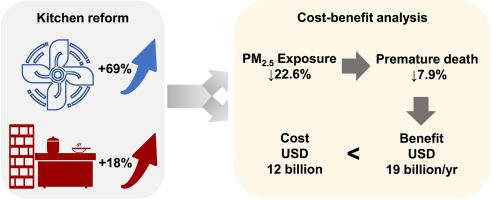Mitigating household air pollution exposure through kitchen renovation
IF 14.3
1区 环境科学与生态学
Q1 ENVIRONMENTAL SCIENCES
引用次数: 0
Abstract
Globally, over three billion people rely on traditional solid fuels for cooking and heating, leading to significant household air pollution and critical public health concerns. While transitioning to clean energy carriers faces challenges of accessibility and affordability—especially among low-income, rural populations—alternative strategies like kitchen layout modifications and the use of ventilation fans may effectively reduce exposure to pollutants. Here, we analyze factors influencing the adoption of separated kitchens and mechanical ventilation and evaluate changes in human exposure to PM2.5 under different kitchen renovation scenarios by conducting a nationwide survey of household kitchen characteristics in rural China. We found that although 82% of rural households have kitchens separated from other rooms, only 34% use mechanical ventilation. The adoption of ventilation fans is significantly influenced by income and education levels. We estimate that widespread implementation of ventilation fans and separated kitchen designs could prevent approximately 67400 premature deaths annually, resulting in a health benefit of about USD 19 billion per year—substantially exceeding the costs involved. These findings suggest that cost-effective kitchen renovations offer enormous potential for substantial health benefits and present a practical solution compared to the challenges of clean energy transitions in rural areas.

通过厨房改造减少家庭空气污染暴露
全球有 30 多亿人依靠传统固体燃料做饭和取暖,导致严重的家庭空气污染和严重的公共健康问题。虽然向清洁能源载体过渡面临着可获得性和可负担性方面的挑战,尤其是在低收入和农村人口中,但厨房布局改造和使用换气扇等替代策略可有效减少污染物暴露。在此,我们通过在全国范围内开展中国农村家庭厨房特征调查,分析了采用分隔式厨房和机械通风的影响因素,并评估了在不同厨房改造方案下人类接触 PM2.5 的变化。我们发现,虽然 82% 的农村家庭将厨房与其他房间隔开,但只有 34% 的家庭使用机械通风。换气扇的采用受收入和教育水平的影响很大。我们估计,广泛采用换气扇和分隔式厨房设计每年可防止约 67400 人过早死亡,每年可带来约 190 亿美元的健康效益--大大超过相关成本。这些研究结果表明,具有成本效益的厨房改造具有巨大的潜力,可带来可观的健康效益,是应对农村地区清洁能源转型挑战的切实可行的解决方案。
本文章由计算机程序翻译,如有差异,请以英文原文为准。
求助全文
约1分钟内获得全文
求助全文
来源期刊

Environmental Science and Ecotechnology
Multiple-
CiteScore
20.40
自引率
6.30%
发文量
11
审稿时长
18 days
期刊介绍:
Environmental Science & Ecotechnology (ESE) is an international, open-access journal publishing original research in environmental science, engineering, ecotechnology, and related fields. Authors publishing in ESE can immediately, permanently, and freely share their work. They have license options and retain copyright. Published by Elsevier, ESE is co-organized by the Chinese Society for Environmental Sciences, Harbin Institute of Technology, and the Chinese Research Academy of Environmental Sciences, under the supervision of the China Association for Science and Technology.
 求助内容:
求助内容: 应助结果提醒方式:
应助结果提醒方式:


